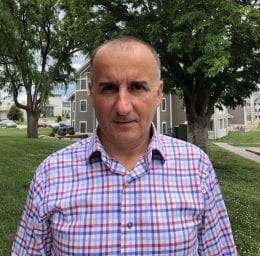
In this special essay, Tamas Kowalik, doctoral candidate in Leadership Communication, offers a cultural and contextual leadership analysis that provides insight into ways strong-man authority structures contribute to Russian aggression. Kowalik urges us to consider individual and collective approaches to leadership action and reminds us that it is never too late to start adaptive work.
My doctoral dissertation theme selection – the role of authority and dependence on authority in a strong authority context – has been determined by my mostly bitter, lived experiences in Hungary. Growing up in Hungary, behind the Berlin Wall, strong authority structures and interactions, including power, position, psychological pressure, public humiliation, judgment, scapegoating, and most importantly, the need to express loyalties to authority, have been part of my life. If not directly affected, through the stories people have told me in my environment.
People lived under oppression, both politically and mentally. It all started in schools, where oral assignments (memorizing and recalling lexical knowledge that happened in front of the class) meant extraordinary psychological pressure and often led to public humiliation. Without thinking of and developing a conscious strategy or repertoire of behavior, I tried to navigate these social interactions and structures. In these situations, most of the time, I felt intimidated and uncomfortable. Depending on the case – especially if it was associated with injustice (which often was the case), I also felt fear and/or anger. I lived in a context where people were socialized to remain silent, hold back, and depend on the authority only sharing their criticism about the authority behind his/her back.
Based on these experiences, I can easily make sense of what exactly is currently happening in Russia, where the silent majority is holding back assisting to the aggression of a strongman. The “Eastern block” has historically been built around hierarchic, strong authority structures leading to dependence on authority. Social expectations have aligned accordingly: people depend on authority (the teacher, boss, doctor, prime minister/president), expecting him (rarely her) to operate in the functions of authority described by Heifetz et al. (2009) providing direction, protection, and order. Heifetz (1994) defines dependence on authority as: “A hierarchical relationship where the expectations of others (authority) are placed upon people (dependent(s)” (p. 70).
In strong authority cultural contexts, partly because of the social-historical development, citizens were socialized to hand over their personal and civic responsibilities, to later find themselves at the mercy of authority figures that then feel free to take self-serving liberties in citizens’ private lives. There are clear signs that some of these “leaders” develop narcissistic characteristics that even border on sociopathy. Even if a part of the silent majority in Russia disagrees with Putin’s aggression, the stakes are high to speak up. Dependence on authority described by Heifetz (1994) entails fewer risks and is more comfortable. These mechanisms eventually contribute to the emergence of charismatic strong authority figures.
Understanding the dynamics of strong authority structures described above shed light on the solution as well: the necessity and critical work of building civic capacity in East-Central Europe. Civic capacity building is meant to counter social mechanisms – effects of socialization agents – that prolong dependence mechanisms. This adaptive work – that can be done through leadership development – includes developing critical thinking and critical empathy, active listening, self-reflection, and discovering the power of collaboration with others to solve public problems – instead of depending on the authority.
The benefits of building civic capacity are clear: it helps counter political manipulations/brainwashing and develop better social relations for collaboration. By putting aside their biases and spiteful behaviors and by listening to different viewpoints, citizens can develop a better understanding of their society, themselves, and the World. Through deliberation, they can develop the capacity of understanding others allowing multiple interpretations to emerge. This can change their attitude towards diversity. But building civic capacity can also help members of societies become better individuals, as they experience the gift of putting egoism aside developing more empathy. With a changed mindset, citizens will no longer depend on a set of values and viewpoints, wanting to impose them on the rest of the society, positioning them as the “desired way” to organize and live their lives.
Citizens furnished with this capacity can also gain more self-confidence and will no longer expect someone to solve their problems for them. They will no longer seek a strongman to lead their country. Russia seems currently lost, but there are other East-Central European societies with the same social-historical traditions. It is never too late to start this adaptive work.
References
Heifetz, R. (1994). Leadership without easy answers. Harvard University Press.
Heifetz, R., Grashow, A., Linsky, M. (2009). The practice of adaptive leadership. Harvard Business Press.
More about the author
 Tamas Kowalik is a Harvard Kennedy School alumnus, a doctoral candidate in Leadership Communication at Kansas State University, and a research fellow with the Kansas Leadership Center.
Tamas Kowalik is a Harvard Kennedy School alumnus, a doctoral candidate in Leadership Communication at Kansas State University, and a research fellow with the Kansas Leadership Center.

But how to do this adaptive work? Especially with populations that have been trained in a certain way of thinking and behaving for generations?